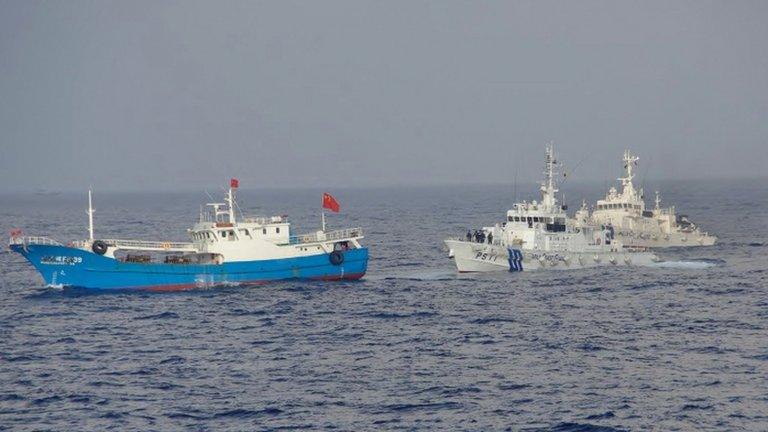China and Japan's media in war of words over radar issue
- Published
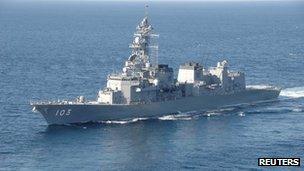
Japan says the Chinese radar locked onto its ship (above) on 30 January
The war of words between media outlets and experts in Beijing and Tokyo is hotting up after a Chinese frigate reportedly put a radar lock on a Japanese navy ship.
The incident, which happened near disputed East China Sea islands last month, sparked angry responses in both capitals with Japanese Prime Minister Shinzo Abe calling it a "dangerous act" and China asking Tokyo to stop "illegal" activities.
Newspapers and experts in both countries followed suit, with leading Japanese daily Yomiuri Shimbun calling the incident a "dangerously provocative act".
Global Times said Tokyo was giving a "one-sided" argument over the issue but official news agency Xinhua, The People's Daily and CCTV have not commented on the issue.
China
An editorial in Beijing's Global Times says Japan has highlighted the radar incident "to sound an alert" between the Chinese and Japanese public. "If the Abe administration's real intention is to implant the idea of an imminent war in the minds of the public, China also must send the same message to the Chinese public," the editorial adds.
A commentary in the Beijing News says Mr Abe wants to strengthen weaponry and even revise the peace constitution. "The US' attitude is cautious and noncommittal on all this. On the eve of (Shinzo Abe's) upcoming visit to the US, using 'radar targeting' to hype up a 'China threat' as a bargaining chip to persuade the US to 'relax restraints' may be the Abe cabinet's painstakingly crafted ruse," the commentary says.
An editorial in Beijing-backed Wen Wei Po says Japan has "other motives in being the guilty party accusing the victim" over this issue. "When visiting the US at the end of February, Abe hopes that US President Obama will have a 'positive' stance on softening restrictions on Japan's right to collective self-defence... To win more bargaining chips, Japan chose this moment to suddenly create the tense atmosphere of an imminent Sino-Japanese military conflict to seek concessions from the US on easing restrictions on its right of collective self-defence," the editorial in the Hong Kong-based newspaper adds.
Jiang Xinfeng, an expert on Japanese studies at the People's Liberation Army Academy of Military Sciences, tells China Daily that in recent years Japan has ramped up "reconnaissance on Chinese vessels and aircraft, and Japanese media prefer playing up regular operations by the Chinese side".
And Yang Bojiang of the Chinese Academy of Social Sciences agrees with Mr Jiang. "The hawkish elite within Japan have been trying to shape public opinion and utilise public fears by hyping the 'worsening security circumstances'. A media frenzy on topics like territorial disputes and missile launches prevails in Japan. The right-wing tendency should be given 'due alert' and the country's policies are moving to the right," Yang says.
Ni Lexiong, director of the Sea Power and Defence Policy Research Institute at the Shanghai University of Political Science and Law, says the Chinese military may have been reacting to provocation by Japanese naval vessels, Hong Kong's South China Morning Post reports.
Prof Da Zhigang, from the Heilongjiang Academy of Social Sciences, told South China Morning Post that Beijing might have been testing how the Japanese navy would respond to emergencies. "The move possibly resulted in a miscalculation of each other's intentions," Prof Da was quoted by South China Morning Post as saying.
Japan
An editorial in Tokyo's Yomiuri Shimbun said: "Crossing the line of international common sense of armed forces is extremely dangerous provocation... Now, not only is China engaging in coercive action towards neighbouring countries in the South China Sea and the East China Sea, besides Asia, China has become a common concern of the international community. Japan should strengthen co-operation with the US and South East Asian countries, while encouraging China to rectify its problem behaviour."
An article in the same paper felt China is "trying to stir up Japan's sense of crisis with military actions in a bid to pressure Japan to admit its sovereignty over the disputed islands. China is escalating its risky nerve war against Japan".
An editorial in Tokyo's Mainichi Shimbun: "Moves that could lead to an armed conflict are an extremely bad and dangerous provocation... The Chinese government and the leadership of the Communist Party should clearly recognise the seriousness of the matter. We strongly urge the Chinese side to never repeat such provocations."
A commentary in Tokyo-based website Nikkei Telecom 21: "High-ranking military officials have reportedly grown increasingly aggressive lately, with some speaking out at Communist Party meetings that territorial wars with Japan, the Philippines or Vietnam may be unavoidable. Heightened tensions with neighbouring countries would help the military secure more defence funding."
"Although China's defence budget has grown by 3.5-fold over the past decade, military officials argue that it is still insufficient for modernising the nation's troops and introducing state-of-the-art equipment," it adds.
BBC Monitoring, external reports and analyses news from TV, radio, web and print media around the world. For more reports from BBC Monitoring, click here. You can follow BBC Monitoring on Twitter, external and Facebook, external.
- Published6 February 2013
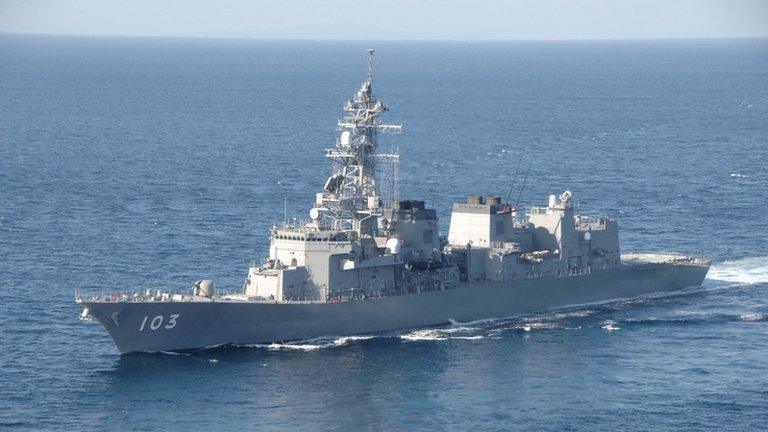
- Published5 February 2013
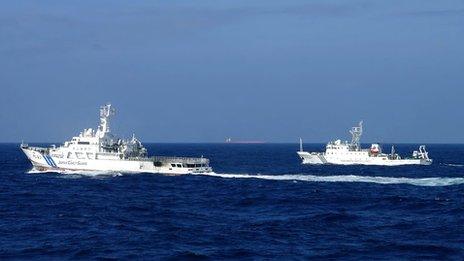
- Published10 November 2014
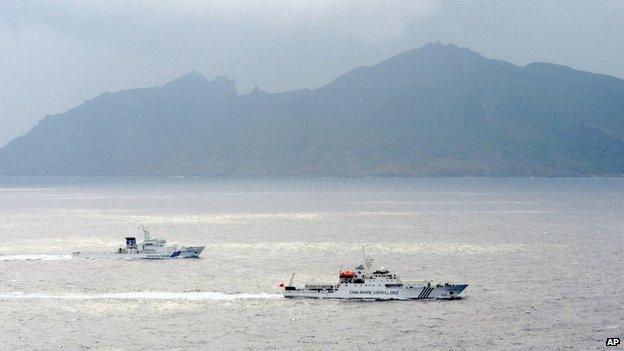
- Published2 February 2013
